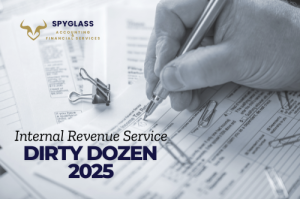The IRS Dirty Dozen 2025: Top Tax Scams to Watch Out For
Tax season is here, and with it comes the annual release of the IRS Dirty Dozen 2025 list—a compilation of the most pervasive tax scams threatening taxpayers, businesses, and tax professionals. For over two decades, the IRS has used this campaign to raise awareness and protect individuals from falling victim to fraudsters who exploit the tax system for personal gain.
In 2025, the IRS Dirty Dozen highlights 12 scams that range from phishing schemes to misleading tax credits. Whether you’re filing your taxes or helping others navigate the process, understanding these scams is crucial to safeguarding your financial and personal information.
Let’s break down the top scams and how you can protect yourself.
What is the IRS Dirty Dozen?
The Dirty Dozen is an annual IRS initiative designed to educate the public about common tax scams. While it’s not a formal enforcement priority list, it serves as a critical warning to taxpayers about the tactics fraudsters use to steal money, personal data, and sensitive financial information.
This year’s list underscores the importance of vigilance, especially during tax season when scammers are most active.
The 2025 IRS Dirty Dozen: Top Tax Scams
1. Email Phishing and Smishing
Scammers use fake emails (phishing) and text messages (smishing) to impersonate the IRS, tax software companies, or financial institutions. These messages often lure victims with promises of tax refunds or threats of legal action.
- Red Flags: Unsolicited messages, alarming language, or requests for personal information.
- How to Protect Yourself: Never click on links or download attachments from unknown sources. The IRS will never initiate contact via email or text.
2. Bad Social Media Advice
Social media platforms, especially TikTok, are rife with misleading tax advice. From misusing Form W-2 to promoting fraudulent tax credits, these posts can lead to identity theft and costly penalties.
- Red Flags: Overly simplistic or “too good to be true” tax tips.
- How to Protect Yourself: Rely on trusted sources like the IRS website or a licensed tax professional.
3. Fake IRS Online Account Help
Scammers pose as helpful third parties offering to create an IRS Individual Online Account for taxpayers. In reality, they aim to steal personal information and file fraudulent returns.
- Red Flags: Unsolicited offers to help with IRS accounts.
- How to Protect Yourself: Create your IRS account directly at IRS.gov without third-party assistance.
4. Fake Charities
Fraudulent charities exploit crises and natural disasters to solicit donations. These scams not only steal money but also harvest personal information for identity theft.
- Red Flags: High-pressure tactics or vague mission statements.
- How to Protect Yourself: Verify charities using the IRS Tax-Exempt Organization Search tool.
5. False Fuel Tax Credit Claims
Promoters mislead taxpayers into claiming the Fuel Tax Credit, which is only available for specific off-highway business and farming uses.
- Red Flags: Promises of inflated refunds or eligibility for credits you don’t qualify for.
- How to Protect Yourself: Consult a tax professional before claiming specialized credits.
6. Misuse of Sick and Family Leave Credits
Some taxpayers incorrectly claim these credits, which are only available for self-employed individuals during the pandemic years (2020-2021).
- Red Flags: Claims for credits outside the eligible timeframe or for non-qualifying income.
- How to Protect Yourself: Review IRS guidelines to ensure eligibility.
7. Bogus Self-Employment Tax Credit
Social media promotes a non-existent “Self-Employment Tax Credit,” misleading gig workers and self-employed individuals into filing false claims.
- Red Flags: Promises of large payouts for COVID-19-related credits.
- How to Protect Yourself: Verify credit details on the IRS website.
8. Improper Household Employment Taxes
Taxpayers invent fictional household employees to claim refunds based on false wages.
- Red Flags: Claims for wages never paid.
- How to Protect Yourself: Only claim legitimate household employment taxes.
9. Overstated Withholding Scam
Scammers encourage taxpayers to falsify income and withholding amounts on forms like W-2 or 1099 to claim inflated refunds.
- Red Flags: Unverifiable income or withholding claims.
- How to Protect Yourself: Use only legitimate income documents to file your return.
10. Misleading Offers in Compromise (OIC)
Aggressive promoters mislead taxpayers into applying for OIC, a program to settle tax debts, even when they don’t qualify.
- Red Flags: High-pressure sales tactics or guaranteed approvals.
- How to Protect Yourself: Use the IRS OIC Pre-Qualifier tool to check eligibility.
11. Ghost Tax Return Preparers
Unscrupulous preparers refuse to sign returns or provide their Preparer Tax Identification Number (PTIN), leaving taxpayers vulnerable to fraud.
- Red Flags: Preparers who charge fees based on refund size or refuse to sign returns.
- How to Protect Yourself: Choose a reputable, credentialed tax professional.
12. New Client Scams and Spear Phishing
Cybercriminals target tax professionals by posing as new clients, sending malicious attachments to steal sensitive data.
- Red Flags: Poorly written emails or unusual requests.
- How to Protect Yourself: Verify new client identities and avoid opening suspicious attachments.
How to Protect Yourself from Tax Scams
- Stay Informed: Familiarize yourself with the IRS Dirty Dozen and other common scams.
- Verify Sources: Only trust information from the IRS, licensed tax professionals, or reputable organizations.
- Secure Your Data: Use strong passwords, enable two-factor authentication, and monitor your financial accounts.
- Report Suspicious Activity: Use IRS Form 14242 to report abusive tax schemes or preparers.
Final Thoughts
The IRS Dirty Dozen serves as a timely reminder that tax scams are constantly evolving. By staying vigilant and informed, you can protect yourself from fraudsters and ensure a smooth tax filing experience.
If you encounter suspicious activity or need help navigating complex tax issues, don’t hesitate to reach out to a trusted tax professional. At Spyglass Accounting and Financial Services, we’re here to help you stay compliant and secure.
Remember, when it comes to taxes, knowledge is your best defense against scams. Stay safe, stay informed, and file with confidence!

